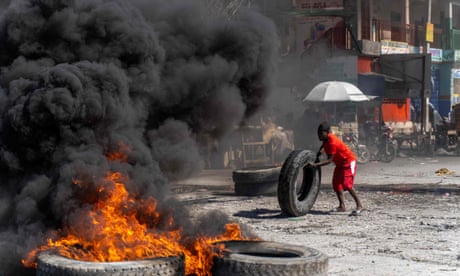- by foxnews
- 08 Apr 2025
‘It’s hell’: vigilantes take to Haiti’s streets in bloody reprisals against gangs
‘It’s hell’: vigilantes take to Haiti’s streets in bloody reprisals against gangs
- by theguardian
- 01 May 2023
- in news

Armed civilians dragging bodies through the streets. Smouldering corpses. Young men with machetes chasing suspected gangsters they planned to kill.
The nightmarish events unfolding in Haiti's coastal capital, Port-au-Prince, began before dawn on Monday when members of one of its notorious gangs reportedly tried to seize control of the city's Turgeau area.
"What they didn't count on was the population striking back," said Charlier, who works in the neighbourhood.
Over the coming hours, civilians brandishing knives, rocks and handguns rose up against the heavily armed criminals who control more than 80% of Haiti's capital and whose activities have led the United Nations to compare the situation there to a war.
"We are planning to fight and keep our neighbourhood clean of these savages," one vigilante, a 37-year-old called Jeff Ezequiel, told the Associated Press.
On Wednesday, as groups sprung up in other communities, another lynching was reported: this time, eight suspected criminals in the community of Debussy.
"We're already dead, so we might as well die fighting," Charlier remembered one person in Turgeau telling her.
The lynchings have sparked a strange and disturbing mix of horror, fear and optimism in Haitian communities fed up with being terrorised by the gangs.
"Seeing the population fighting back - even though there are lots of human rights violations, even though justice by the people is never the way to go because it just spirals into a cycle of violence that never stops - gives you ... the sense that people are as mad as you are," said Charlier. "What's happening is giving hope to the population that they can fight back."
"It is obscene," the author and activist Monique Clesca said of the lynchings. "But that's what these bandits have pushed us to."
"It's more than frustration ... [Rage] is the only word," Clesca added, blaming the surge of mob justice on years of elite political corruption and connivance with organised crime.
Daniel Foote, the outspoken former US special envoy to the Caribbean country, said he was also unsurprised at the violence, given the police's failure to bring the gangs to heel.
"At some point I thought they were going to start to take matters into their own hands because they've got no choice. They've got nothing else," Foote said.
"The Haitians, like anybody, can only take so much. The gangs have stolen their lives from them," Foote added, as a spokesperson for Haiti's embattled and enfeebled national police force implored citizens to stop. "Do not take justice into your own hands," Garry Desrosiers told reporters on Wednesday.
That plea looks likely to fall on deaf ears, given the scale of the security catastrophe facing the Caribbean's second-largest city, which was levelled by an earthquake in 2010 and has been struggling to find its feet ever since.
As people in Port-au-Prince fought to reclaim their communities, the UN secretary general's special envoy to Haiti offered a chilling overview of the country's "rapidly deteriorating security situation" and the parallel humanitarian crisis that have left almost half of Haiti's 11 million citizens going hungry.
Maria Isabel Salvador told the UN security council that March had seen Haiti's highest number of reports of murders, rapes, kidnappings and lynchings since 2005. Children had been shot in classrooms and snatched at school gates. Snipers had indiscriminately targeted civilians. Women had been terrorised by "multiple-perpetrator" rape.
"Faced with these increasingly violent armed gangs vying for control of neighbourhoods of the capital, with limited or no police presence, some residents have begun to take matters into their own hands," the Ecuadorian diplomat reported. "These dynamics lead indefectibly to the breakdown of social fabric with unpredictable consequences for the entire region."
Clesca said it was hard to know where the nascent anti-gang insurrection would lead. "They are small [incidents], but they are significant. Will they multiply? What will happen? I think we have to watch and we have to be very sensitive to that," she said, predicting the coming weeks would see "more people, cities and towns rising up and saying: 'We are not taking this. Enough is enough.'"
Foote also wondered whether the rebellion might signal a new phase in Haiti's political, humanitarian and security crises, "because this is the first time that people have really taken matters into their own hands, which is how the Haitians won independence [in 1804] and have kept their independence a number of times since then".
The dire outlook has prompted calls for an international intervention - a call repeated by Salvador at the UN. "The Haitian people cannot wait. We need to act now," she said, calling for the urgent deployment of "an international specialised force" to fight gangs.
Foote said he was "100% ideologically opposed" to another foreign intervention, given the miserable track record of previous efforts including the 2004-2017 UN stabilisation mission, whose peacekeepers brought cholera to Haiti and were accused of sexual abuse and exploitation.
Charlier rejected calls for a foreign intervention. "I recognise the police cannot deal with this alone," the activist said, but nor did she want thousands of heavily armed foreign troops to return "to put a Band-Aid on a cancer".
"Honestly, I don't know [how I feel]. I just hope this is going to end very soon because I'm mentally drained and I'm exhausted," Charlier said before concluding with a grim prophecy.
"What we are seeing in Haiti will end in blood and in ashes," she warned. "In people being killed and in houses being burned."
- by foxnews
- descember 09, 2016
Ancient settlement reveals remains of 1,800-year-old dog, baffling experts: 'Preserved quite well'
Archaeologists have recently unearthed the remarkably well-preserved remains of a dog from ancient Rome, shedding light on the widespread practice of ritual sacrifice in antiquity.
read more


